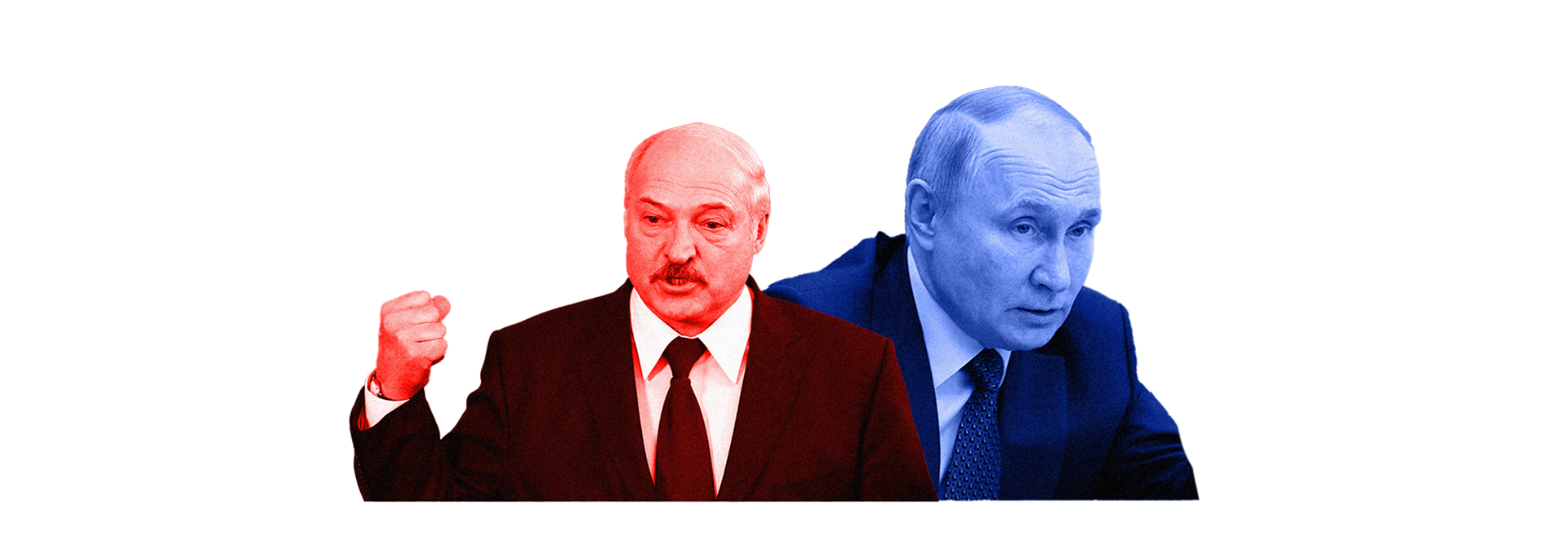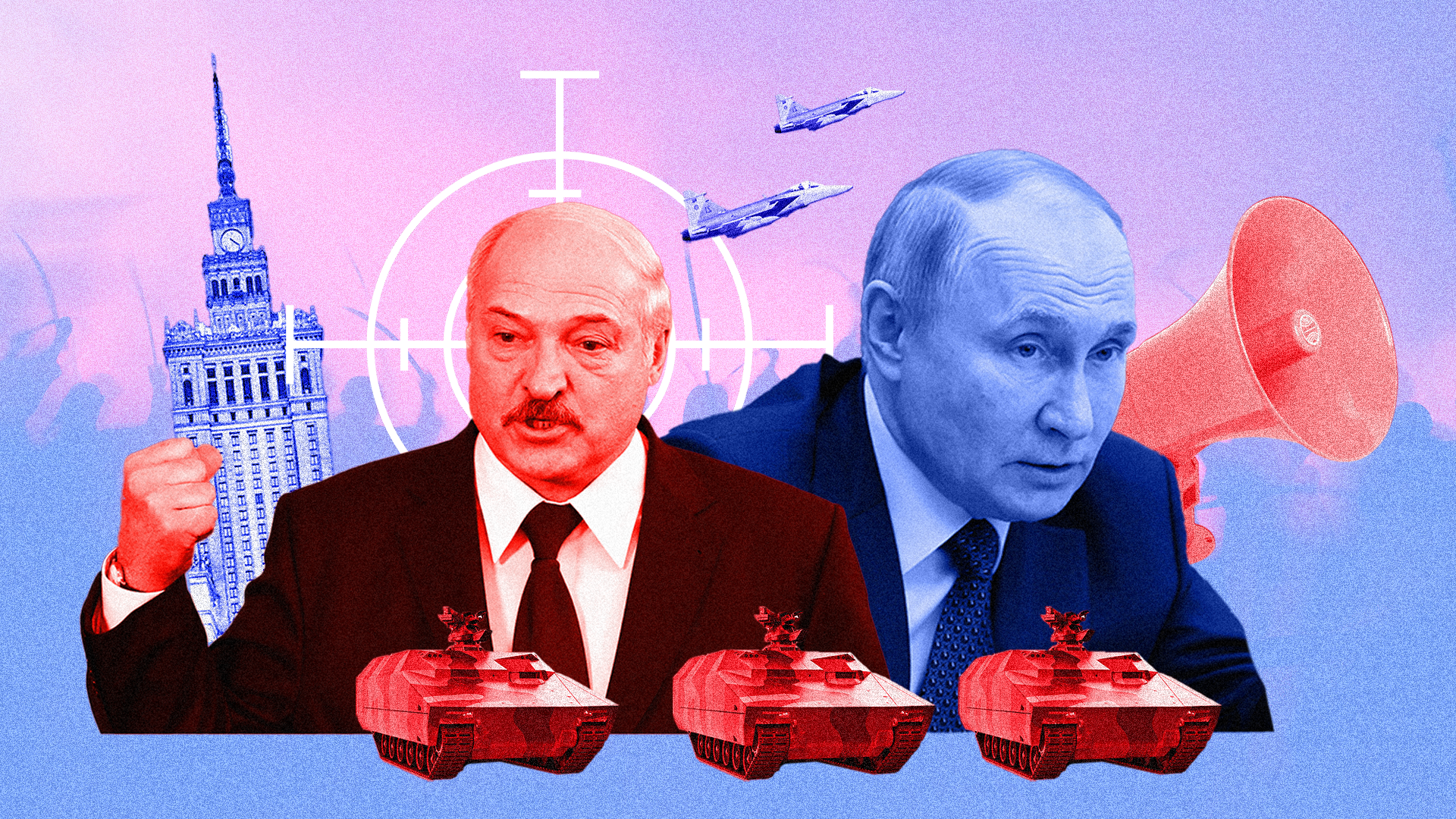Belarusian President Alyaksandr Lukashenka talks about an „excursion to Poland” with the Wagner Group, Vladimir Putin accuses Poland of revisionist plans, and the Poles started massively strengthening their eastern border. The situation between the Russian-Belarusian alliance and Poland became extremely tense. But what exactly is going on in this region?
Belarusian President Alyaksandr Lukashenka is a long-time ally of Russian President Vladimir Putin. Minsk has been a stalwart supporter of Moscow since the Russian invasion of Ukraine began last February and has been indirectly involved in the war against Kyiv. Belarus opened up its territory to Russian forces to launch missiles from the country, store weapons, and use its airspace.
On 23 and 24 June, the notorious Russian paramilitary organization Wagner Group, led by Yevgeny Prigozhin, basically declared war on the Russian Ministry of Defense and made a surprisingly smooth advance toward Moscow, leading to a remarkable event in Russian-Belarusian relations. Although the rebellion was soon thwarted, as Prigozhin changed his mind and stopped the coup attempt, it is undeniable that the event must have caused the Russian president to worry about losing face. Putin later called Prigozhin’s rebellion treason, but quite bizarrely, Prigozhin was acquitted and appears to remain free and unharmed in a country where it is very easy to go to prison these days, for instance, due to simply calling the war a war. But how is the Belarusian president connected to the attempted coup by the Wagner Group? President Lukashenka, according to himself, acted as a conciliatory third party between the rebel Prigozhin and the Russian government. He negotiated with President Putin, contacted Prigozhin, and managed to get him to abandon the rebellion and continue his activities in Belarus instead of Russia by moving the Wagner Group’s operations center there.

Prigozhin’s whereabouts remain unknown, but Lukashenka claims he is in Russia. However, on 19 July, a very poor-quality video of Prigozhin was posted on social media: the first public footage of the Wagner leader since the coup attempt suggests that he is in Belarus, welcoming his redeployed troops there. But it cannot be said for sure that the video is not fake.
Nonetheless, the Wagner mercenary army is undoubtedly in Belarus, and they already established a military base near the village of Tsel. Satellite images of the rapidly expanding base were published by the Belarusian Hajun project, showing how a large number of vehicles and military equipment were deployed in just a few days.
.@washingtonpost published a new satellite image of the Wagner base near Asipovichy by @Maxar and @umbraspace. According to Maxar Senior Director Stephen Wood, it shows that “dozens, if not hundreds, of vehicles and equipment have recently arrived at the facility.”
— Belarusian Hajun project (@Hajun_BY) July 22, 2023
1/4 pic.twitter.com/Hd7kgD84JV
To put it mildly, the situation is worrisome for Poland, a neighbor of Belarus with which relations have long been tense. The Poles’ fears about the Wagner Group’s relocation to a neighboring country are not unfounded, as the Belarusian head of state recently made the shocking statement that the Wagner Group would like to go on an „excursion to Poland.” The threatening comments were made in Saint Petersburg after the Russian president met his Belarusian ally for the first time since Lukashenka’s intervention in the coup attempt. Poland cannot and will not take these statements lightly, as it is well known that there is ample cause for tension between the two countries: Firstly, Poland is a committed and generous supporter of Ukraine, which the Belarus-Russia alliance is destroying. Secondly, Minsk had already caused huge problems for Warsaw on their shared border years ago when Lukashenka opened the border to refugees heading for its western neighbor, motivated by the sanctions against his country. The border unrest has turned into tragic events on more than one occasion, with refugees freezing to death and being subjected to brutal treatment by both the Polish and Belarusian authorities. Poland responded to the crisis by building a 5.5-meter-high, 186-kilometer-long steel wall along its eastern border last summer. The Polish government has repeatedly stressed that the supported influx of refugees was an attempt by Lukashenka to destabilize the region.

And the hybrid warfare has not stopped here: after setting up the military base near the village of Tsel in Belarus, by the end of July, about a hundred Wagner mercenaries had moved to Grodno near the Suwałki Gap, which marks the Polish-Lithuanian border. Speaking at a press conference, Polish Prime Minister Mateusz Morawiecki said that the developments were a cause for deep concern as it is likely to be another attempt to destabilize Poland, in particular, to resume the illegal transit of refugees into Poland. „For almost two years, we have been struggling with a constant attack on the Polish border,” said Morawiecki, adding that „this year alone, there have been more than 16,000 attempts to cross the border illegally by migrants whom Lukashenka and Putin are trying to push across the Polish border.” The prime minister described the Wagner mercenaries’ expansion as a hybrid attack: „They will probably disguise themselves as Belarusian border guards and help illegal immigrants to enter Polish territory with the aim of destabilizing Poland. Presumably, they will also try to sneak into the country pretending to be illegal immigrants, which poses an additional security risk.” Morawiecki called the Wagner mercenaries „ruthless murderers” who are now stationed on the border of Poland.
The current situation, namely Lukashenka’s threats and the willingness of the Wagner mercenaries stationed in Belarus close to the border to go on excursions to Poland, is a new escalation of the long-standing conflict between the Lukashenka regime and the Western allies. Yet it remains unclear whether the situation will indeed erupt into violence. It may be more of a question of showing power from the Belarussian side to demonstrate that Minsk is capable of contending with NATO. The attack is quite unlikely as both the Wagner Group and Lukashenka certainly know that a Wagner military attack on NATO member Poland would be a grave provocation against the Western military alliance, which would almost certainly result in a serious immediate response, and the mercenary army is heavily outnumbered and has much less resources. So, an attack on Poland would pose such a risk to both Minsk and Moscow that it is simply not worth launching it.
Yet the Poles did not hesitate for long: In the days following Lukashenka’s statements advocating a Polish excursion, they were already deploying a convoy of military armored vehicles to the Belarussian border.
Od kilku dni na terenie województwa podlaskiego stacjonuje ponad tysiąc żołnierzy #WojskoPolskie i prawie 200 jednostek sprzętu. Trwa operacja #BezpiecznePodlasie. To demonstracja gotowości sił zbrojnych na potencjalne zagrożenia oraz rozwijanie zdolności wojsk. pic.twitter.com/QXffYhs8C5
— Sztab Generalny WP (@SztabGenWP) July 24, 2023
The Western powers did not ignore the Wagner movements and Lukashenka’s statements either. Matthew Miller, the spokesperson of the US Department of State, said that Washington is in a strong alliance with Warsaw and assured that „the United States will defend every inch of NATO territory,” clearly indicating that aggression against Poland would have immediate consequences. German Defense Minister Boris Pistorius also pledged his country’s support to Poland, saying that the Poles would receive German support if needed.
Besides the tension on their eastern border, Poland is also under ideological attack by the Russian president. On 21 July, Vladimir Putin accused Poland of having revisionist plans, namely, to take control of Western Ukraine. The Russian head of state also provocatively stated, “Poland, thanks to Stalin’s position, received from the Soviet Union considerable, formerly German territories in the West. The western territories of present-day Poland are a gift from Stalin to the Poles, have our friends in Warsaw forgotten about this? We will remind them.” The Polish side has strongly condemned President Putin’s statements, with PM Mateusz Morawiecki tweeting about Stalin as a war criminal „responsible for the deaths of hundreds of thousands of Poles” and saying that Russia’s ambassador to Warsaw would be summoned for the Russian president’s „provocative statements.” This was indeed done, with Polish Deputy Foreign Minister Paweł Jabłoński communicating his country’s position to Russian Ambassador Sergey Andreev in Warsaw, stating that his country firmly rejects any attempt at revisionism and calling Putin's statements „pseudo-historical speculation.”
Stalin był zbrodniarzem wojennym, winnym śmierci setek tysięcy Polaków. Prawda historyczna nie podlega dyskusji. Ambasador Federacji Rosyjskiej zostanie wezwany do MSZ.
— Mateusz Morawiecki (@MorawieckiM) July 21, 2023
Graphics by Réka Pisla

Accessories for a stylish bank robbery: fashion for bank robbers | #DIVE

IKEA celebrates its 80th birthday with a new collection










